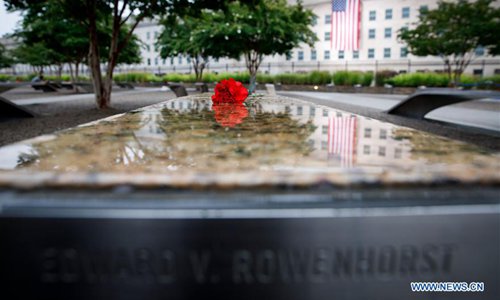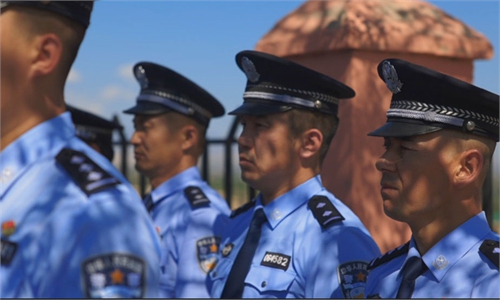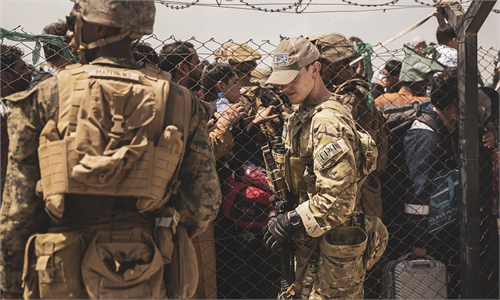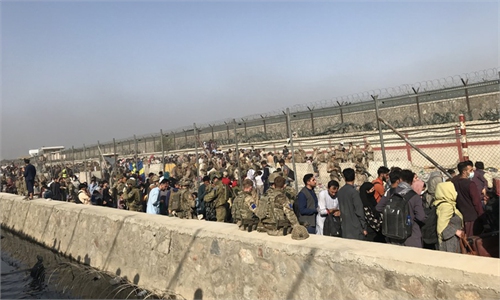Back to where it was 20 years ago, will US go through Afghan nightmare all over again?

A flower is placed at the National 9/11 Pentagon Memorial. (Xinhua/Ting Shen)
What exactly did the terrorist attacks in the US two decades ago bring to the world? The recent withdrawal of US troops from Afghanistan is only part of the answer.
To those who are concerned with China-US relations, the story of 9/11 attacks should begin in the spring of 2001. After taking office in 2001, former US president George W. Bush immediately directed US' foreign strategy at China. He was seeking an alternative rival to the Soviet Union during the Cold War in a bid to build a national consensus. This was also conventional practice of US presidents during the Cold War.
China soon became an option for Bush. However, at that time, China was far from what it is like today. Twenty years ago, it was not the world's second largest economy after the US.
Then, China became a member of the WTO, preparing to boost its economy through integration into the international community. But Americans have already felt the impact of "Made in China." This was reflected in Bush's presidential campaign - which targeted China as a way to gain more voter support.
Yet, more causes were needed, especially for the military, to persuade Americans to widely perceive China as an adversary as the Soviet Union.
On April 1, 2001, a US EP-3 reconnaissance aircraft flew on to China's doorstep in the South China Sea, hitting a Chinese military aircraft and causing the death of a Chinese pilot. Even though no evidence shows this was a deliberate practice by the US military over the past 20 years, the location and time of the incident did well fit the US strategic realignment.
The manner of US public opinion toward China then changed drastically. For example, homes of ethnic Chinese in the US were vandalized with eggs thrown at them. An expert said on a TV show that the ultimate goal of China's rise was to occupy the US. I also noticed a reader's letter to a newspaper saying that the US must immediately take the following steps: freeze the assets of Chinese in the US, detain all Chinese citizens living in the US, cease trade with China, and send aircraft carriers to the Chinese coast. I was shocked to see such a letter published.
Afterwards, Bush officially authorized the sale of a major package of arms to the island of Taiwan. But that seemed not enough for him. Later, during an interview with ABC's Good Morning America news program, Bush confirmed that the US is obligated to defend Taiwan in the event of an attack by the Chinese mainland. He then promised that Washington would do "whatever it took" to help Taiwan defend itself if the mainland attacked the island. As the Washington Post commented back then, Bush's declaration "appeared to erase a 22-year-old US policy of leaving unclear whether the United States would intervene to defend Taiwan." Meanwhile, people were wondering if the White House would develop a more complete long-term strategy against China.
But then occurred the 9/11 attacks. This disaster made Americans realize their real enemies are terrorists hiding somewhere. This tragedy also forced the Bush administration to adjust its global strategy, making counter-terrorism top of the agenda. Later, three major points were established to support the US' counter-terrorism strategy: preemption, cooperation with allies and international institutions like the UN, and the promotion of democracy.
Until today, some US scholars still insist that the US has lost its opportunity to contain China's rise because of its fights against terrorism. Eric Edelman, a former US undersecretary of defense said recently, "The focus on terrorism and weapons of mass destruction, I think, may have diverted attention to some degree from China and the threat it represents."
However, what these people have forgotten is that the idea of "China threat" came to them only under the circumstance that the war on terror had drastically reduced the threat of terrorist activities to the continental US. And without support from major countries like China, the US' fights are unlikely to achieve the results Washington wanted.
Such mentality of the US elites has also made people realize one thing: The impulse of hegemonism deeply rooted in these Americans' minds hasn't changed a lot in 20 years. These US elites still think that the world belongs to Washington, and that nobody can challenge its position around the globe.
So they will always have to fashion an enemy for themselves; and will always have to rely on an enemy to lift themselves up.
Washington will never stop even if its endeavors to continue to conquer, transform and dominate the world are already facing several obstacles. The retreat now is only a pause before making a better strike later.
From a historical point of view, the US seems to have returned to where it was before the 9/11 attacks. Washington has so many strategy experts with a deep knowledge of both history and current affairs. But I'm afraid that none of them can accurately predict whether history will repeat itself or not.
The author is a senior editor with People's Daily, and currently a senior fellow with the Chongyang Institute for Financial Studies at Renmin University of China. dinggang@globaltimes.com.cn. Follow him on Twitter @dinggangchina




